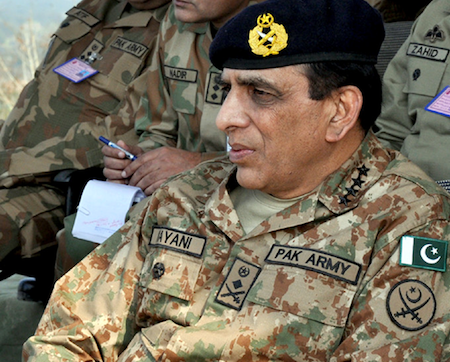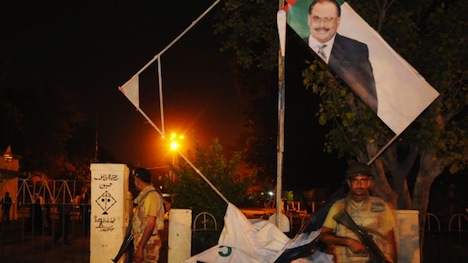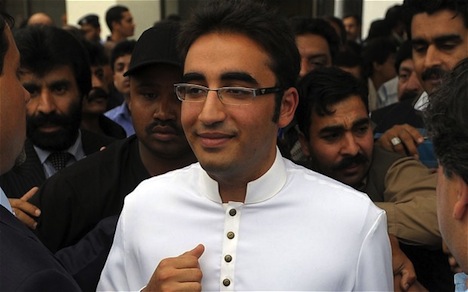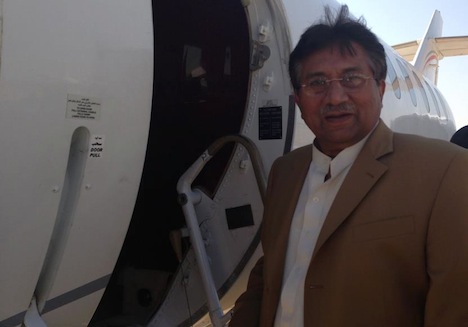
Last weekend, Pakistan’s prime minister Raja Pervez Ashraf heralded the completion of the first full government in Pakistan’s history since partition from India and independence in 1947.
Today, Pakistan’s president Asif Ali Zardari (pictured above) announced that new elections for Pakistan’s National Assembly (ایوان زیریں پاکستان), the lower house of the Majlis-e-Shoora ( مجلس شوریٰ), Pakistan’s parliament, will be held on May 11.
Before jumping into an analysis of Pakistan’s upcoming election, let’s first debunk a few myths.
While the Pakistan People’s Party (PPP, پاکستان پیپلز پارٹی) deserves some credit in crawling to the five-year finish line and therefore, the end of its term, it’s far from clear that Pakistan has approached anything like a mature democracy, despite Ashraf’s claims that democracy is here to stay for Pakistan. There are reasons to believe that the winner of the May 11 elections might not be as lucky as the previous government, so self-congratulation is quite premature.
Moreover, most decision-making power for truly life-and-death issues lies in the hands of either Pakistan’s military or the Directorate for Inter-Services Intelligence (ISI), and even then, their power doesn’t extend entirely throughout the entire country — it’s especially weak in the Federally Administered Tribal Areas (FATA) along Pakistan’s northwestern border with Afghanistan.
But it still means that the chief of army staff since 2007 (and director general of the ISI from 2004 to 2007), Ashfaq Kayani (pictured below), is more powerful than Ashraf or even Zardari, even as he’s tried to institute military reforms to reduce the military’s direct role in politics and has pledged to keep the military from interfering in the May elections. His current term as chief of army staff expires in November 2013.

The PPP came to power after elections in February 2008, following the end of a nine-year military rule by Pakistani general Pervez Musharraf. Those elections followed the return and subsequent assassination of Benazir Bhutto, the former prime minister who had returned to Pakistan in late 2007 following Musharraf’s National Reconciliation Ordinance (which attempted to provide a blanket immunity against former political leaders with respect to corruption) in order to run in the upcoming elections.
Ashraf (pictured below) has been prime minister for less than a year, taking over after a showdown among Pakistan’s Supreme Court, on the one hand, and Zardari and former prime minister Yousuf Raza Gillani, on the other hand, over corruption charges. Zardari, Pakistan’s president and the Bhutto’s widower, became Pakistan’s president in September 2008, and remains the key power broker within the PPP, though his official power is waning after 2010 constitutional reforms transferred much of the power of the presidency to the prime minister. Zardari’s term will end in September 2013.

In his address to Pakistanis on Saturday night, Ashraf admitted that the government has not been able to ‘provide rivers of milk honey,’ but it’s nonetheless attempted to tackle the myriad problems of the predominantly Muslim country of 180 million people, the world’s sixth-most populous.
Those problems include some of the world’s worst corruption (which is very much a bipartisan endeavor in Pakistan), and they include continuous military tension with India, which most recently flared up last month.
Pakistan’s economy has slowed from the Musharraf years, in part due to the abandonment of privatization in favor of a more corporatist state capitalism model championed by Gillani’s government. More now than ever, relatively weak economic growth plagues Pakistan, even in light of rapid inflation. Furthermore, the PPP government hasn’t made incredible progress on any of the country’s longstanding development issues, including uneven access to water and electricity, widespread poverty, widespread unemployment, illiteracy and poor health care.
That’s all before you come to the issue of global terrorism and Pakistan’s role in harboring some of the world’s most determined Islamic radicals — it was a compound in Abbottabad, remember, where U.S. forces ambushed al-Qaeda leader Osama bin Laden in May 2011.
So, no, there’s not much ‘milk and honey’ these days in Pakistan — it ranked as the 13th most failed state in the Fund for Peace’s failed state index in 2012.
Despite a shaky foundation for respecting democratically elected governments, Pakistan features relatively robust political activity that breaks down on a heavily regional basis, and the PPP is far from assured of winning a second consecutive term in office. Continue reading More about Pakistan’s ‘milestone’ and a preview of its upcoming May 11 elections →
![]()
![]()






